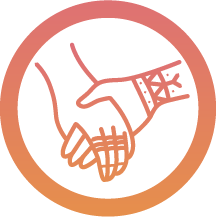Were you able to have family and community supports with you during your cancer journey?
Why is this indicator important to First Nations, Inuit and Métis?
The quality of the patient care experience is enhanced when medical care or physical interventions are accompanied by mental, emotional, cultural, and spiritual support.
This support offered by family, or other community supports such as an elder or escort accompanying the patient throughout the cancer treatment journey, is critical.
Such supports can help navigate language and cultural differences, explain and advocate for the patient, intervene in instances of culturally unsafe care, and provide social and spiritual support. Sometimes, this can also be offered through Indigenous patient navigators within the hospital setting.1
View Indigenous determinants of health
How does this affect care and outcomes?
In addition to the inconvenience and hardship of extended travel, patients are impacted by the isolation of long periods away from home for cancer treatment. Having someone there for emotional support is critical.
Having someone from the family or community along for appointments to advocate for the patient can improve care by addressing any challenges due to travel, communications and language barriers or concerns about cultural safety. A trusted family or community member can assist with driving and/or the physically demanding aspects of travel, attend appointments to help in conveying information and receiving care instructions, provide language translation, sign consent forms and provide medical history. Even when appointments are virtual, the support of a family member or interpreter is essential.
Other trusted community supports, such as Elders, can provide emotional and cultural support like prayer, song or access to traditional food and medicine. Elders are acknowledged by their community as having the gift of knowledge about ancestral language, teachings, prayer, medicines and ceremonies. Their calming presence and wise counsel are helpful during stressful times, so it is important that patients can access community supports throughout their cancer journey.
Unique perspectives from Inuit
The following are excerpts from Inuit patient perspectives gathered in 2010 through the Partnership’s The Truth of It video series. They describe the stressful experience of travel and the compelling need for the mental and emotional support of an escort.
I live in Kugluktuk and we have to travel from Kugluktuk to Yellowknife, overnight in Yellowknife, then fly on to Edmonton the next day. The travel alone, it’s long, you’re already worried about, gee, you know, what’s going to happen to me…
I had an option of staying in Winnipeg for four months but I didn’t want to do that so I chose to do the three weeks and go for my treatment; go back home for three weeks. So I did that from November to April and then a year from that I had the Herceptin treatment every three weeks. I travelled quite a bit….
They did try to get me to have treatment here one time but it was too expensive for the government to send a nurse up here. I got used to travelling and I was so happy to have an escort the whole time. It’s more of a mental thing—you don’t want to go through this by yourself. No matter how strong you are, it’s always good to have someone right there beside you.
Towards health equity
Family and community support persons are important to a patient’s care and should face no barrier in accessing transportation programs and other financial supports for transportation, lodging, and meals so that they can attend all appointments with the patient.
Though some support for travel is provided to First Nations and Inuit individuals and their escorts through Health Canada’s Non-Insured Health Benefits, this coverage is not provided for Métis citizens and non-status First Nations individuals. Coverage also varies across territories and provinces. This context is further described in the Indicator: Were you able to receive care close to home?
What this would mean for people in Canada
People with cancer should not have to worry about being alone when seeking the care they need.
Cost will not limit a patient’s ability to travel with a caregiver or support person.
View indicator development process
View ways of measuring the indicators
- Patient Navigator supports – Culturally relevant care is an important part of the recovery process. Indigenous patient navigators help Indigenous patients and their families connect with services while receiving care in hospitals. Typically they can offer support with: one-on-one support with clients via telephone or in-person; accessing culturally relevant care options; connecting patients to community resources; coordination of traditional ceremonies and connections with Elders; advocacy for patients and families; support/liaison between care teams and patients; planning for short-term and long-term healthcare needs. Linking with an Indigenous Patient Navigator is offered if a patient self-identifies as Indigenous during registration. With the patient’s permission, the Indigenous Patient Navigator can follow the patient through triage, admission, inpatient stays and outpatient visits.

